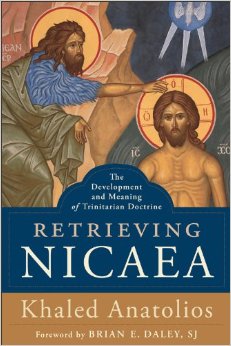 Something God has never been without is philanthropia, love of humanity, and this divine attribute was manifested in Christ. Here’s how Paul puts it in Titus 3:3-7:
Something God has never been without is philanthropia, love of humanity, and this divine attribute was manifested in Christ. Here’s how Paul puts it in Titus 3:3-7:
For we ourselves were once foolish, disobedient, led astray, slaves to various passions and pleasures, passing our days in malice and envy, hated by others and hating one another. 4 But when the goodness and loving kindness (ἡ χρηστότης καὶ ἡ φιλανθρωπία) of God our Savior appeared, 5 he saved us, not because of works done by us in righteousness, but according to his own mercy, by the washing of regeneration and renewal of the Holy Spirit, 6 whom he poured out on us richly through Jesus Christ our Savior, 7 so that being justified by his grace we might become heirs according to the hope of eternal life.
God’s philanthropia –I’ll keep using Greek to flag this as a special word, and to compensate for several modern Bible translations not quite doing justice to it– was an important theme in patristic theology. An easy place to pick up the thread of the discussion is to trace it through Khaled Anatolios’ excellent 2011 book Retrieving Nicaea: The Development and Meaning of Trinitarian Doctrine. The word is woven throughout the book –and indexed!
Anatolios begins the story with Athanasius, who used the idea of divine philanthropia to critique a notion of divine presence that assigned transcendence to the Father and immanence to the Son. An eminent churchman like Eusebius of Caesarea, even at his best, was, er, not un-guilty of this. But
Athanasius offers an alternative construal of the character of divine transcendence. Instead of assigning divine transcendence and immanence to the Father and Son respectively, he construes them as attributes that belong to divine being as such and are harmonized through the category of philanthropia, God’s love for humanity. While God is by nature inaccessible, he makes himself accessible to creation through his love. No distinct mediating being is needed because the divine nature mediates its own transcendence through God’s loving condescension…. Characterizing God primarily in terms of philanthropia and mercy –attributes whereby God can transcend his own transcendence– explains why no mediating being is needed and how the incarnation accords with the character of God’s being and the divine deportment in the act of creation. (p. 104)
Later Anatolios refers to “the philanthropia that is equally shared by Father and Son” (108).
If some of Anatolios’ way of putting things (“transcend his own transcendence!”) seems to stretch beyond the scope of Paul’s usage, Anatolios is nevertheless capturing something that the Greek fathers saw clearly in Titus which more recent interpreters have missed. Think of the oddness of Paul’s locution in Titus 3:4: “the philanthropia of God our Savior appeared.” This is a far cry from the “when the fullness of time had come, God sent forth his Son” of Galatians 4. In the Titus formulation, Father and Son are telescoped into each other both by the peculiar circumlocution “the appearing of philanthropia” and by the polysemy of “God our Savior.”
Q: Did the Father send the Son?
A:”Philanthropia appeared.”
Q: So… that’ s a yes?
A: Here’s a clue: “He saved us through the Holy Spirit who he poured out on us through Jesus Christ our Savior.”
Why would a pro-Nicene theologian like Athanasius ever want to de-emphasize the distinction between the Father and the Son? In order to clarify the fact that Father and Son are on the same side of the majesty-condescension continuum. If the weak side of fourth century theology was falling into the trap of construing Jesus Christ’s lowliness as a revelation of his eternal lowliness or subordination to the Father in essence, Athanasius pushed back: “the condescension of the incarnation does not indicate that the Word was lowly in his very nature but rather that the self-abasement was a manifestation of the philanthropia of the divine nature” (Anatolios, 119). Or again,
The pro nobis of the Son is located in his economic self-abasement, which in turn is grounded in the philanthropia of the divine nature rather than in a putative secondary divinity.
Anatolios traces much more in the use of this term: from Athanasius it is picked up in Gregory of Nyssa, and it is unfolded in more pneumatological ways, ultimately yielding a kind of trinitarian analogy within the structure of human community. It’s really remarkable to see how much heavy lifting the notion did in Greek patristic thought. Let’s do more with it in the future; it’s right there in Titus.